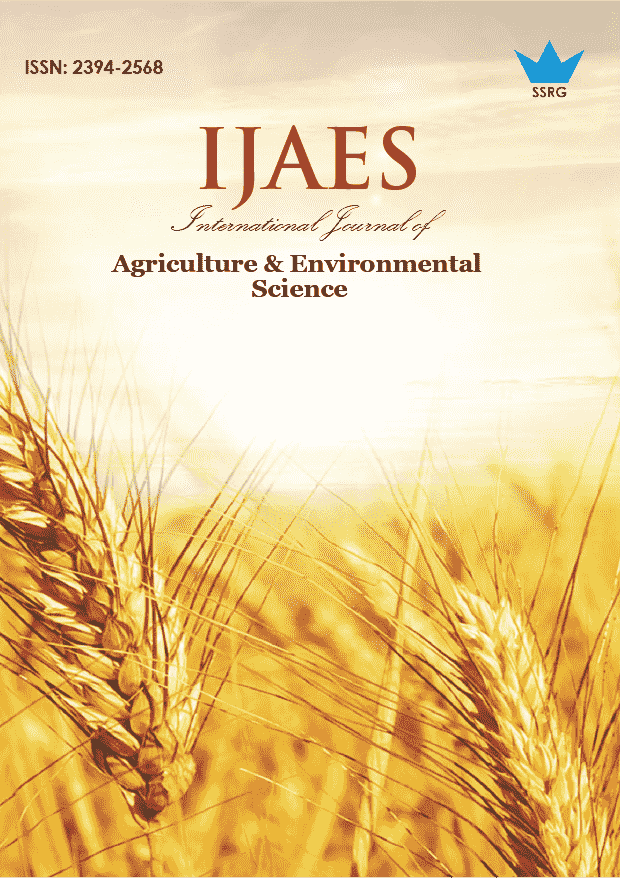The Perception of Women Migrant Workers On Agricultural Work In Tanggulturus Village, Besuki District, Tulungagung Regency

| International Journal of Agriculture & Environmental Science |
| © 2021 by SSRG - IJAES Journal |
| Volume 8 Issue 3 |
| Year of Publication : 2021 |
| Authors : Tanti Eka Rahmawati, Jabal Tarik Ibrahim, Rahayu Relawati |
How to Cite?
Tanti Eka Rahmawati, Jabal Tarik Ibrahim, Rahayu Relawati, "The Perception of Women Migrant Workers On Agricultural Work In Tanggulturus Village, Besuki District, Tulungagung Regency," SSRG International Journal of Agriculture & Environmental Science, vol. 8, no. 3, pp. 23-27, 2021. Crossref, https://doi.org/10.14445/23942568/IJAES-V8I3P104
Abstract:
This research aims to identify factors that influence women migrant workers’ perception of agricultural work. The total research subjets are 50, and the sampling technique used is simple random sampling. All respondents are Tanggulturus villagers in Besuki district, Tulungagung Regency, who are migrant workers. Research data use questionnaire and is analyzed using SEM (Structural Equation Modeling) with Smartpls program. The tested model has met the SEM analysis standard. Based on the analysis, the results show factors that significantly impact migrant workers’ perception of agricultural work as follows: (1) parents’ support; (2) education; (3) land area owned; (4) planted agricultural commodities; (5) income. Privilege and prestige variables are proven not the factors that influence the migrant workers’ perception of agricultural work. The analysis research results show that 75.4% of the women migrant workers’ perception is influenced by parent’s support who work as a migrant worker, education, a land area owned, planted agricultural commodities, and perception on income.
Keywords:
perception, women migrant, agriculture
References:
[1] Anwarudin, O., Satria, A., & Fatchiya, A., A Review on Farmer Regeneration and Its Determining Factors in Indonesia, International Journal of Progressive Sciences and Technologies, 10(2) (2018) 218–230.
[2] Auta, S. J., Abdullahi, Y. M., & Nasiru, M., Rural Youths’ participation in agriculture: Prospects, challenges and the implications for policy in Nigeria, Journal of Agricultural Education and Extension, 16(3) (2014) 297–307. https://doi.org/10.1080/1389224X.2010.489769
[3] Ayanlade, A., Radeny, M., & Morton, J. F., Comparing smallholder farmers’ perception of climate change with meteorological data: A case study from southwestern Nigeria. Weather and Climate Extremes, (2017) 24–33. https://doi.org/10.1016/j.wace.2016.12.001
[4] Azizah, S. N., International Mobility Based on Women Labour: Study of Changes in Socio-Economic-Cultural Family Former migrant worker Jakatawa Bulaksari In the village, District Bantarsari, Cilacap Seen From the Perspective of Islamic Economic Theory. Ijtimā’iyya: Journal of Muslim Society Research, 3(1) (2018) 129–149. https://doi.org/10.24090/ijtimaiyya.v3i1.1744
[5] Cheteni, P., Youth Participation in Agriculture in the Nkonkobe District Municipality, South Africa. Journal of Human Ecology, 55(3) (2016) 207–213. https://doi.org/10.1080/09709274.2016.11907025
[6] Ibrahim, J. T., & M, Z. M., Structural Transformation of Agricultural Sector in East Java Indonesia, International Journal of
Economics and Management Studies, 7(3) (2020) 1–7. https://doi.org/10.14445/23939125/ijems-v7i3p101
[7] Ibrahim, J. T., Mazwan, M. Z., & Mufriantie, F., Factors Affecting Rural Youth Interest in Agriculture in Sindangkasih Ciamis District, International Journal of Humanities Social Sciences and Education, 8(2) (2021) 277–288. https://doi.org/10.25015/16202030742
[8] Immamul Insan, E. S., Konformitas Pada Remaja Akhir Putri : Provinsi Nusa Tenggara Barat menjadi, 3(1) (2020).
[9] Inegbedion, G., & Islam, M. M., Youth motivations to study agriculture in tertiary institutions, Journal of Agricultural Education and Extension, 26(5) (2020) 497–512. https://doi.org/10.1080/1389224X.2020.1773285
[10] Kidido, J. K., & Bugri, J. T., Youth Access to Agricultural Land from Peri-urban and Rural Perspective: A Study of Techiman Traditional Area in Ghana. Journal of Land and Rural Studies, 8(1) (2020) 37–56. https://doi.org/10.1177/2321024919883145
[11] Kidido, J. K., Bugri, J. T., & Kasanga, R. K., Youth Agricultural Land Access Dimensions and Emerging Challenges Under the Customary Tenure System in Ghana, Journal of Land and Rural Studies, 5(2) (2017) 140–163. https://doi.org/10.1177/2321024917700940
[12] Kuncoro, B. S., Faktor-Faktor yang Mempengaruhi Pengambilan Keputusan Menjadi Tenaga Kerja Indonesia (Studi Kasus di Kabupaten Grobogan), Economics Development Analysis Journal, 6(4) (2017) 386–394.
[13] Mulatmi, S. N. W., Anggraini, A. D., Adiyastiti, B. E. T., & Sutawi., Adoption of Innovations in Smallholder Dairy Farms in East Java, Indonesia, International Journal of Agriculture and Environmental Research, 07(01) (2021) 214–224. https://doi.org/10.51193/ijaer.2021.7113
[14] Nurul Aeni., Pengambilan Keputusan Menjadi Pekerja Migran Indonesia Perempuan, Jurnal Litbang Industri, 9(2) (2019) 119–126.
[15] Tu, S., & Long, H., Rural restructuring in China: Theory, approaches and research prospect, Journal of Geographical Sciences, 27(10) (2017) 1169–1184. https://doi.org/10.1007/s11442-017-1429-x
[16] Zid, M., Casmana, A. R., & Hijrawadi, S. N., The development of international education towards migration abroad by Indonesian women, Universal Journal of Educational Research, 8(5) (2020) 1953–1963. https://doi.org/10.13189/ujer.2020.080532

 10.14445/23942568/IJAES-V8I3P104
10.14445/23942568/IJAES-V8I3P104